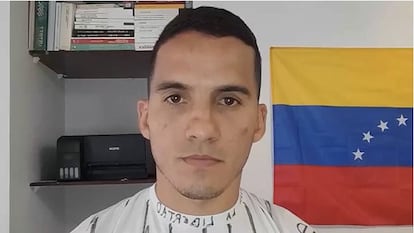Alleged kidnapping of former Venezuelan soldier in Chile: What we know so far
The Chilean government has filed a complaint regarding the case of Ronald Ojeda Moreno, who was taken from his apartment in Santiago at dawn


The kidnapping of Venezuelan citizen Ronald Leandro Ojeda Moreno, 32, — who was taken from his home in Chile — was first reported by his family to Chile’s national law enforcement, the Carabineros, and then to the Investigative Police (PDI). It took place at 3:15 a.m. on Wednesday, in a building in the municipality of Independencia, in the northern sector of Santiago. According to security camera footage, three individuals in PDI uniforms, with dark helmets, what appeared to be bulletproof vests, and their faces covered, arrived at Ojeda’s apartment on the 14th floor and took him away. A fourth person stayed with the doorman. Ojeda was barefoot and only wearing his underwear. In the parking lot, a gray car with a blue beacon is seen.
On Wednesday, shortly after 11 a.m., the press reported that a PDI operation on the Central Highway, in the municipality of Renca, had uncovered a gray car that had been abandoned around 5 a.m. Police clothing was found inside the vehicle, which is why it was linked to the kidnapping. At that point, the alleged victim had still not been identified.
Ojeda’s name was made public shortly after 3 p.m., when the Chilean media reported on the alleged kidnapping, which is being investigated by Santiago’s Organized Crime and Homicide Team (ECOH), a unit that was created in November in response to the unprecedented rise in homicide in Chile.
Theories on social media
In parallel to the investigations, at 12:30 p.m. on Wednesday, former Venezuelan security secretary Iván Simonovis, who today is a leading opponent of the Venezuelan government, identified the victim as Ojeda in a post on X (formerly Twitter). He said that Ojeda was a former lieutenant, and argued that the kidnapping may have been an operation orchestrated by Venezuela’s General Directorate of Military Counterintelligence (DGCIM). In his post, he attached a video, supposedly of the moment in which Ojeda is taken from his apartment.
The Chilean government did not confirm the kidnapping until 8:00 p.m. The Undersecretary of the Interior, Manuel Monsalve, gave a press conference at La Moneda, Chile’s seat of government. But he only referred to Ojeda as a “Venezuelan citizen,” and did not mention that he was a former soldier. “Indeed, there was a kidnapping of a Venezuelan citizen in the early hours of the morning, as I believe is now public knowledge, in the municipality of Independencia.”
Monsalve said that the Prosecutor’s Office had classified the investigation confidential, adding: “What matters here is protecting the integrity of the victim and his family.”
“As many hypotheses have been raised, the government is also considering all possible hypotheses,” said Monsalve, without mentioning what these were. This cautious statement was made after Monsalve’s meetings with Interior Minister Carolina Tohá, Justice Minister Luis Cordero and Foreign Minister Alberto Van Klaveren. At the press conference, he also announced that the government had called on Interpol to issue an international alert and implemented measures to tighten control at the country’s borders.
It was not until Thursday that the Chilean government contacted Venezuelan authorities.
Ojeda's profile
Ronald Leandro Ojeda Moreno settled in Chile in 2017. On social media, he is an active opponent of the Venezuelan government. The Gabriel Boric administration has not confirmed whether or not Ojeda was a political refugee. Monsalve said Wednesday that it is illegal to reveal this information. Local media, however, report that he was given political refugee status at the end of December 2023.
Ojeda, former first lieutenant and trained commando, is one of the 33 soldiers of the Bolivarian National Armed Forces (FANB) who were expelled and demoted on January 24 by the Venezuelan Defense Ministry. A list of the demoted military personnel — in which Ojeda’s name appears — was published by the Defense Ministry, which accused the group of committing “criminal and terrorist” actions against Venezuelan President Nicolás Maduro. In a statement, it said that the soldiers faced charges of “treason against the country.”
Rise in kidnappings
Ransom kidnappings have been on the rise in Chile, fueled above all by transnational gangs. Between 2016 and 2020, the Metropolitan Region of Santiago, recorded between six and eight cases a year. In 2021, this figure jumped to 26. But the biggest rise was in 2022, when 46 cases were registered. As of November 2023, 45 kidnappings have been recorded, according to information from the PDI.
In one case, Chilean businessman Rudy Basualdo, 50, was kidnapped in broad daylight in Rancagua, a city located about 52 miles from Santiago. He was released 40 hours later on November 10 after paying a million-dollar ransom. On Tuesday, seven people were arrested for the kidnapping. The Rancagua prosecutor, Javier Von Bischoffshausen, said the suspects belonged to Los Piratas del Tren de Aragua, a criminal organization that “is partly located abroad, specifically in Venezuela.”
On February 13, police arrested two suspects involved in the ransom kidnapping of two Venezuelans in Renca, who were held captive for 30 hours. The kidnappers demanded a $50,000 ransom, sending messages to the victims’ relatives in Chile and Venezuela.
Ojeda’s case has so far been different, which explains why the government and the Attorney General’s Office have both said they are not ruling out any hypothesis. But, privately, authorities are considering at least four: a possible international operation, kidnapping for ransom, a gang-related kidnapping and even a fake kidnapping.
Unlike other kidnappings, no one has yet demanded a ransom for Ojeda’s release. In some cases, however, the kidnappers did not ask for a ransom until several days later. The location and the timing of the kidnapping is also different. Ojeda was taken from the 14th floor of a building in the early hours of the morning, while in most kidnappings the victim is forced into a vehicle from a public road. It is also the first time, since the recent rise of kidnappings, that the captives have disguised themselves as police officers.
Diplomatic negotiations begin
On Thursday, shortly after 2:00 p.m., the Chilean government referred to Ojeda’s case for the second time. Monsalve announced that the government had filed a complaint and will be part of the case. He again cautiously referred to the victim as “a Venezuelan citizen,” and insisted that, “in serious crimes, the government is open to all hypotheses.”
Monsalve reported that spoke via videoconference with President Gabriel Boric, who is on vacation, and the ministers of the Interior, Foreign Affairs and Justice. “Obviously, the president considers this a priority,” he said. Shortly before, Monsalve also met with the national prosecutor, Ángel Valencia; prosecutor Héctor Barros, who coordinates the ECOH, and the senior officers of the Investigative Police.
The government confirmed that it has taken a further step, and begun diplomatic efforts with Venezuelan authorities through the Chilean ambassador to Venezuela, Jaime Gazmuri. Chilean police have also been with their counterparts in Venezuela. “Our ambassador is already making arrangements to be able to have a conversation with the vice minister for the Americas of Venezuela’s Foreign Ministry, and we are in contact at all levels: government, police and through the corresponding prosecutors’ offices,” said minister spokesperson Camila Vallejo.
Sign up for our weekly newsletter to get more English-language news coverage from EL PAÍS USA Edition
Tu suscripción se está usando en otro dispositivo
¿Quieres añadir otro usuario a tu suscripción?
Si continúas leyendo en este dispositivo, no se podrá leer en el otro.
FlechaTu suscripción se está usando en otro dispositivo y solo puedes acceder a EL PAÍS desde un dispositivo a la vez.
Si quieres compartir tu cuenta, cambia tu suscripción a la modalidad Premium, así podrás añadir otro usuario. Cada uno accederá con su propia cuenta de email, lo que os permitirá personalizar vuestra experiencia en EL PAÍS.
¿Tienes una suscripción de empresa? Accede aquí para contratar más cuentas.
En el caso de no saber quién está usando tu cuenta, te recomendamos cambiar tu contraseña aquí.
Si decides continuar compartiendo tu cuenta, este mensaje se mostrará en tu dispositivo y en el de la otra persona que está usando tu cuenta de forma indefinida, afectando a tu experiencia de lectura. Puedes consultar aquí los términos y condiciones de la suscripción digital.








































